One Night with the King
 for violence, some sensuality and thematic elements..
for violence, some sensuality and thematic elements..
Reviewed by: Sheri McMurray
CONTRIBUTOR
| Moral Rating: | Excellent! |
| Moviemaking Quality: |
|
| Primary Audience: | Adults Family |
| Genre: | Drama Historical Christian |
| Length: | 2 hr. 3 min. |
| Year of Release: | 2006 |
| USA Release: |
October 13, 2006 |
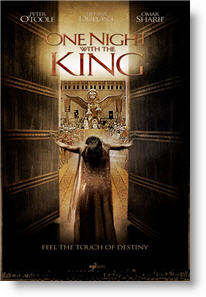
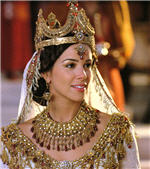
What does the Bible say about…

Esther / Hadassah
Xerxes / Ahasuerus
Uncle Mordecai
Haman- Queen Vashti
- About the book of Esther

Read the Book of Esther- The festival of Purim

What is the significance of Iraq in the Bible? Answer- Persia
- Women of the Bible
- Miracles of the Bible
See movie review: Esther (2000)

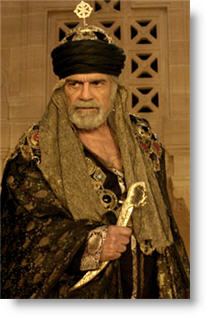
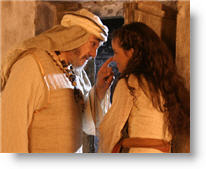
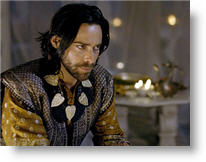
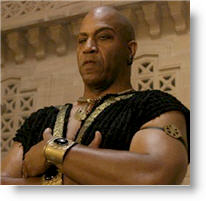
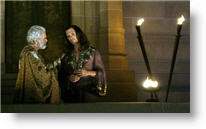
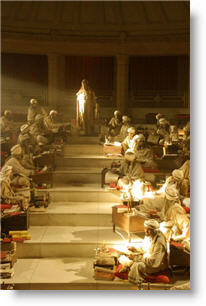
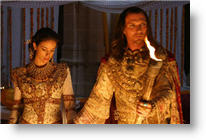


| Featuring |
|---|
|
Peter O'Toole … Samuel Tiffany Dupont … Esther James Callis … Haman John Rhys-Davies … Mordecai Omar Sharif … Prince Memucan Luke Goss … Xerxes John Noble … Prince Admantha Tommy Lister … Hegai |
| Director |
|
Michael O. Sajbel |
| Producer |
| Gener8Xion Entertainment / Marilyn Beaubien, Stephan Blinn, Richard J. Cook, Matthew Crouch, Wendi Lampassi, Lawrence Mortorff, John Nelson |
| Distributor |
Esther, Jewish queen of gentile Persia, set a remarkable example of personal sacrifice. Although understandably at first hesitant, she willingly risked her life so others could be saved. In this respect she prefigured the sacrifice of the coming Messiah, Jesus of Nazareth, who willingly gave His life so each of us could have the opportunity to receive God’s gift of salvation, eternal life in His Kingdom.
The book of Esther is a complement to the books of Ezra and Nehemiah. Although those books in the Bible describe life for the Jews who returned to Palestine, Esther is the only Bible book that offers a portrait of those who chose to remain in Persia.
Esther’s story takes place near the end of these events described in the Old Testament. The two kingdoms of Israel and Judah had fallen and been taken into captivity in Assyria and Babylon, respectively.
Hadassah, Esther’s real Jewish name (played with sweet genuineness by beautiful new comer, Tiffany Dupont), was born in Susa (Shushan), a city east of the Tigris River, into a loving and devout Jewish family whose roots lay in the esteemed tribe of Benjamin. When she was just a child her Mother and Father were killed by the armies of the decedents of the evil King Agag of the Amalakites.
It was a wonderful “history lesson” within this film to go back 500 years to the pivotal event which leads up to the massacre of many Jews down through these centuries, including Hadassah’s parents. The fact being that King Saul was not obedient to God’s instructions to destroy “utterly” the Amalekite King Agag and all his peoples, including all their possessions and livestock. The Prophet Samuel (a cameo appearance by Peter O’Toole, who at age 74 is still a commanding presence onscreen) denounces Saul’s disobedience and proclaims, “…for rebellion is as the sin of witchcraft, and stubbornness is as iniquity and idolatry. Behold, to obey is better than sacrifice…” Samuel draws his sword to go and finish the commandment of God.
Hadassah’s older cousin Mordecai (John Rhys-Davies in a decisive yet touching performance), a scribe serving in the court of King Xerxes, has taken care of the orphaned girl since her parent’s death.
“And Mordecai had brought up Hadassah, that is, Esther, his uncle’s daughter, for she had neither father nor mother” (the book of Esther, Chapter 2 verse 7).
The love they hold for one another is truly more like that of a father and daughter. He is concerned for her safety and cares much that she is becoming a beautiful girl on the brink of womanhood. He regards her as a “young lady of purity,” setting the stage for her terrifying capture into the royal harem of the King.
King Xerxes (handsome British actor, Luke Goss) has been advised to take a new, more worthy, Queen after the beautiful Queen Vashti publicly humiliates him by refusing to attend a great celebration. This refusal is a direct violation of royal protocol, which all his advisors back with unwavering regard. So King Xerxes orders his servants to launch a search throughout the empire for a new and more devoted Queen.
“Then let the young woman who pleases the king be queen instead of Vashti” (Esther 2:2-4).
The king agrees with the edict of protocol and looks forward to the prospect of a beautiful wife who could become his new queen.
As the danger draws ever more near that Hadassah may be the next to be taken captive, Mordecai makes her swear to never divulge her Jewish linage for fear she may be slain. He changes her name to “Esther,” which is a Babylonian word for “star,” but having the double meaning for the Jewish “Star of David.” Esther hesitantly agrees and “had not shewed her people nor her kindred: for Mordecai had charged her that she should not show it” (Esther 2:11).
The king’s decree brought to his palace many beautiful young women, but none was more beautiful than Esther. From the beginning Hegai (the best ever performance by former wrestler Tom “Tiny” Lister, Jr.), a eunuch and custodian of the women, favored Esther, “so he readily gave beauty preparations to her, besides her allowance” (Esther 2:9).
In turn, each young maiden was presented before the king. When it came Esther’s turn, she was allowed to choose her jewels from the royal storehouse. However, “she requested nothing but what Hegai the king’s eunuch, the custodian of the women, advised. And Esther obtained favor in the sight of all who saw her” (verse 15). Hegai knew the king’s social tastes. Esther deferred to Hegai’s advice, and out of this blossomed a perfect friendship.
Finally, Esther was presented before the king. “The king loved Esther more than all the other women, and she obtained grace and favor in his sight more than all the virgins; so he set the royal crown upon her head and made her queen instead of Vashti. Then the king made a great feast, the Feast of Esther, for all his officials and servants; and he proclaimed a holiday in the provinces and gave gifts according to the generosity of a king” (verses 17-18). Thus Esther became more than just queen of Persia, she and King Xerxes had a committed relationship based on true love.
Beneath the obvious love story is a wave of treachery and deceit. The king’s cousin, Admatha (a deliciously vile John Noble—perhaps even as evil as his LOTR roll as Denethor) is plotting with the captain of the king’s guard, Haman (James Callis, ever the master of the traitorous character) to overthrow the king and take the kingdom from Xerxes. And as the biblical account goes, Mordecai overhears a plot to poison the king, alerts Esther, who in turn saves her beloved’s life. She commands that Mordecai’s name be put on the royal record as the sole reason the king’s life was saved, for without the keen eyes and ears of Mordecai, the King’s fate would have been certain death.
Another chain of events then begin that will eventually threaten Esther and Mordecai and all of the Jewish nation, longtime enemies of the Amalakites, of which Haman was chief.
At this point, I would say we are in part two of this wonderful movie. The first half so far being a positive love story akin to near fairy tale status. The second half becomes more dark and riveting as Haman schemes and nearly succeeds, in annihilating the whole of the Jewish peoples then living. In the process, he intends on elevating himself and his family to near kingly levels.
King Xerxes promotes Haman above all other officials and nobles, even giving Admatha’s house and possessions over to Haman. King Xerxes was kept from knowing it was indeed Mordecai, his Jewish scribe, that found out the plot of Admatha to poison his cousin and take over the throne. The king was led to believe it was because of Haman’s bravery that Admatha’s plot was squelched.
And so, by the king’s order all the others were to bow and pay homage to Haman. But Mordecai, faithful to God’s instruction that prohibited the veneration of anyone but God (Exodus 20:5), refuses. Haman then is inspired by his rage, to underhandedly get the King’s order to overtake all Jewish possessions as they are “a threat to the Kingdom because of their alliance with the democracy loving Greeks.”
Haman presented this plan, couched in deceptive language to hide his motivation, to the king:
“There is a certain people scattered and dispersed among the people in all the provinces of your kingdom; their laws are different from all other people’s, and they do not keep the king’s laws. Therefore it is not fitting for the king to let them remain. If it pleases the king, let a decree be written that they be destroyed, and I will pay ten thousand talents of silver into the hands of those who do the work, to bring it into the king’s treasuries” (Esther 3:8-9).
The king, alarmed at this perceived threat, agrees: “The money and the people are given to you, to do with them as seems good to you” (verse 11). The decree gave any Persian the right to kill Jews and loot their property. The city of Shushan and the palace were in confusion over this decree made in haste.
Up to this point, the king’s top council has been his faithful servant and servant of his father before him, Memucan (the best among his most recent roles, Omar Sharif). But the confused King Xerxes doesn’t listen when Memucan warns that signing the proclamation set down by Haman would be a threat to continued peace within the kingdom. Memucan advises and reminds Xerxes of all his father had built: “Solomon prospered upon the peace his own father had forged.” King Xerxes is now at a crossroads, in his role as leader and as his role as husband, for he knows that his wise Queen Esther feels that all men are created as equals under God.
When Mordecai learns that Haman, the king’s chief officer, is planning the total destruction of the Jews, he asks Esther to urge the King to stop the impending massacre. “If you remain completely silent at this time, relief and deliverance will arise for the Jews from another place, but you and your father’s house will perish. Yet, who knows whether you have come to the kingdom for such a time as this?” (Esther 4:14).
Even though, by law and royal protocol, she is forbidden to approach the king unless summoned, the brave Esther boldly goes before him as he holds court. The tension in this scene as Esther enters the court of King Xerxes uninvited, under peril of certain death to save her people, was every bit as emotionally charged as the famous chariot race in “Ben Hur.”
Knowing the story of Esther before seeing “One Night With The King” is like knowing the story of Moses before seeing “The Ten Commandments.” The lush beauty and rich, full character portrayals bring true life to Scripture and makes one want to see it over and over again. I cannot say enough about how this film takes a well-known part of Jewish history and brings it to vibrant life—at the same time treating the subject with integrity and all due respect. “One Night With The King” is a powerful testament to the Jewish roots of Christianity. It is a must-see for Christian and Jew alike.
Rated PG, this film can be watched and enjoyed by the entire family. There is no blood or violence, although there are obvious times when these subjects are referred to. There is no sex or nudity. The true love expressed between Esther and King Xerxes is mastered in a honest and beautiful way. She tells him the “story” of a boy named Jacob and his love for Rachel, being so strong and pure that he is willing to work 7 years and then 7 more years to win her hand in marriage. There is not even a kiss between them until the wedding night. The story is rich in texture and balanced between drama and humor, suspicion and intrigue, love, bravery, prayer, faith and God’s guidance.
Esther is a stunning role model for anyone of any age. The character of this young woman is for all to aspire to. She makes the best of a terrible situation when she and the other maidens are rounded up to be “candidates” for consideration of the king. She prays to God for guidance and courage. She encourages everyone to consider the precepts of God, without provoking conflict. Esther supports the fact that all people are equal in God’s eyes and that love is the greatest commandment in any culture. She shows wisdom and strength when making her decision to intercede for those who have no hope—for her people, Israel. She knows she may loose her own life and the love of her life, for doing so. Esther is shown praying, for she knows “those who wait on The Lord, shall renew their strength.”
Mordecai is a tribute to what the strength of every father and an honest worker for God can be. I loved the scene where he stands before Haman as others bow a knee before him and proclaims there is but one true God “the God of Abraham, Isaac and Jacob!” John Rhys-Davies proclaims his lines with such conviction, he is Mordecai in that instant. I cried to think there are so many men today who should and must stand up for this right, but instead push it to the wayside, in our society.
“One Night With The King” is an excellent, moving film that will change your perspective about our Christian heritage. The complete production was top notch. The sets were breath-taking, and the costumes stunning. Gener8Xion Entertainment has given its audiences a film for all to indulge in. I can truthfully say, it is right up there with other Biblical epics we’ve loved and enjoyed—not to mention the fact it can be used as a teaching tool that sets a fine example. It follows Biblical perceptive without being preachy, holding close to the basic story of Esther, and giving us some wonderful dialogue to follow, liberally laced with Scripture verse.
So many evil things do happen in our lives. Can we believe God for protection? We must be careful to interpret Scripture with Scripture, and if we examine the record, we find that God did not always protect His people from harm. He has absolute power to keep us safe, both physically and spiritually, but His engineering of the universe made room for man’s freedom to choose—a freedom of will to obey or to disobey Him. This is a deep mystery. Man’s disobedience brought evil into the world, and all of us are subject to it. God does not cancel out its effects, even for His choicest servants (John the Baptist, Stephen, those nameless victims of Hebrews 11:35-37, for example).
Nevertheless, we have the promises of God (read Romans 8:35-39) We can rest assured that we are invulnerable, so long as God does not give permission for us to be hurt. If He gives that permission, He will not leave us alone. He goes with us through the valley, the deep water, the furnace. He will never, absolutely never, leave us or forsake us. Esther knew this with all her heart, and this absolute assurance took her through a mission—The Valley of death, fraught with treachery—holding on tight to The Hand of God, He brought her safely out on the other side.
I can’t wait for the DVD to come out, and I hope it will include how they cast the character of Esther and a visit to India where they actually filmed within the exquisite ruins of centuries-old fortresses. I will place it in its rightful spot between “King Of Kings” and “The Ten Commandments.”
God has a purpose for every challenge He allows to come our way. As Esther, let us stand firm and allow Him to accomplish His will in our life!
Violence: Minor / Profanity: None / Sex/Nudity: None
See list of Relevant Issues—questions-and-answers.


Excellent! / 5
You see this was a good film considering all the other trash out there. Furthermore, for those who criticized the character of Esther, I think she did an excellent job. She was very well played and very simple, but beautiful. I would give this film an “A,” considering the day and hour which we live in. It sure beats seeing other films that Hollywood feels the need to add trash to the movies. I think as with any film—Ten commandments, Ruth, etc.—there is not a better author, perfector or finisher of our faith, but God himself.
Excellent! / 3
Excellent! / 5
Excellent! / 5
Excellent! / 4
Excellent! / 5
Excellent! / 5
Excellent! / 4
Excellent! / 5
Excellent! / 5
Excellent! / 5
Excellent! / 5
Excellent! / 5
Excellent! / 5
Excellent! / 4
However, even though kids prefer movies in which the scenes are generally stand-alone, self-explanatory, and very active, I still believe that all ages should go and enjoy this film. “One Night with the King” also contains a few moral lessons: one relates to the importance of personal relationship over performance to gain other’s approval, and another lesson concerns the treasure of individuality and displaying one’s own character instead of falling in line with the popular standard for acceptance. Overall, “One Night with the King” is a fantastic work of art.
Excellent! / 5
Excellent! / 5
Excellent! / 5
Excellent! / 5
On the positive side, the sets and costumes were beautiful, the male and female leads were attractive, and the actors did the best they could with the (sometimes corny) script—I was especially impressed with the man who played Hegai. There is absolutely nothing in this film that would be inappropriate for young children, but it will bore most of them. It would probably make a great Christian date movie, though. The best thing about this film is that it made me want to reread the book of Esther. Any film that gets me to read a certain part of the Bible is okay with me.
Excellent! / 3
Excellent! / 5
Excellent! / 5
Excellent! / 4
Excellent! / 5
Excellent! / 5
Excellent! / 5
Excellent! / 5
Excellent! / 5
Excellent! / 5
Excellent! / 5
Excellent! / 4
Excellent! / 4
Excellent! / 5
Excellent! / 5
Good / 5
Excellent! / 5
Excellent! / 5
Excellent! / 5
Excellent! / 5
Excellent! / 5
Excellent! / 5
Excellent! / 5
Excellent! / 5
Excellent! / 5
Excellent! / 3
Excellent! / 5
Excellent! / 4
Excellent! / 5
Excellent! / 5
Excellent! / 5
Good / 5
Excellent! / 5
Excellent! / 5
Excellent! / 5
Excellent! / 5
Excellent! / 5
In addition to that, the intrigue that made the book so compelling was missing. I appreciated the fact that some backstory was included, albeit briefly, but the conflict involving Haman seemed separate from the rest of the film until the very end. Personally, I would have liked to see more screentime devoted to the conflict between Haman and Mordecai/Esther/Xerxes, rather than the lame, and totally unfounded lover’s spats the king and queen kept having. I know that conflict was designed to heighten Esther’s reluctance to appear unsummoned before the King, but that entire plotline fell flat, in my opinion. I guess I felt there were many scenes throughout the film that had little significance in the grand scheme of things, while other scenes that should have been included were not. And, as a filmmaker myself, I had such high hopes for this.See all »
Excellent! / 3
Extremely Offensive / 3
Some of the acting at times seemed unskilled, while other times I was blown away. It was like soup… in it you get a little of everything and a lot of everything. It left me confused, but I would recommend it, and probably will see it again. The scenery was awesome, the cinematography was breathtaking and so was the costuming. …
Excellent! / 5
Moral rating: Better than Average / Moviemaking quality: 3½
Another part of scripture that was missing was Esther had 2 private banquets for Haman before she told the truth. Once and then she told the king she would tell him what she wanted at the second banquet. The movie showed one banquet, however, I understand that they probably didn’t want the movie to drag, but if they wanted the movie to stay true to the bible, they failed. I would see it again, but I just think it could have followed the book that it was based from more than it did.
Good / 4
Excellent! / 3
Average / 2
Average / 2
Average / 1
Better than Average / 3
Good / 1
Excellent! / 4
Average / 1
Better than Average / 3
Good / 2½
Good / 4
Excellent! / 5
Good / 3
Excellent! / 5


My Ratings: Excellent! / 5